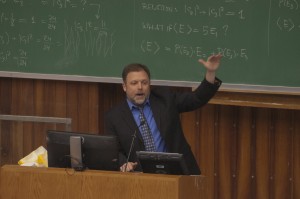Tim Wise, a nationally-acclaimed anti-racism speaker, spoke to a packed Hoyt Auditotium last Thursday, Feb. 27. He has spoken in all 50 states to students at over 800 high school and college campuses.
Dean of the College Richard Feldman spoke about the importance of anti-racism discussions at a social event prior to Wise’s talk. We must “desire to be a campus in which we talk about hard issues,” Feldman said. “[We need to] have the uncomfortable conversations.”
Feldman then mentioned issues that arose last semester with racism on campus after a student hung a Confederate flag in the window of a house on campus. “I think [Wise’s] work and influence can help us with [these] issues,” Feldman said.
Director of the Intercultural Center Michelle Thompson-Taylor welcomed people to the talk] with words of praise for Wise’s work and her hopes for continuing the discussion after his presentation. “We can do something after this talk and push forward our efforts to make our campus and culture a better place,” she said.
Wise has written six books including his memoir “White Like Me,” a revised version of which was published in 2011. He also created a documentary with the same title explaining the issue through another medium.
“[You need] a multi-media presentation that demonstrates the realities of ongoing institutional racism and racial inequality, the reality of ongoing material and psychological white privilege, the advantages to those of us in the dominant group, is helpful,” Wise said in an interview with the Huffington Post. “It does something a book can’t do.”
Wise prefaced his talk by saying that African Americans have said everything he has said many times before– people just hadn’t been listening. “Wisdom comes from a lot of places. Wisdom comes from a lot of folks and we have to be ready to hear it,” he said.
Since this is the 25th year Wise has been traveling and giving anti-racism talks, he structured his talk around themes he has observed over time.
The first overarching theme was the way that white and black people think and talk about racism. “What I’ve come to understand is that very few people actually like talking about race and racism,” he said. “We [white people] are deathly afraid we are going to say the wrong thing and be thought of as racist.”
Another big theme was the way people are, in Wise’s words, “blamed for where they are on the [economic] ladder.”
“What’s the one thing we have been taught. In America, anybody can make it,” Wise said.
“If you don’t make it, it’s your fault.”
Wise provided economic facts about white families versus African American families in the U.S. According to Wise, the average white family makes 20 times more than the average African American family and 18 times the average of a Latino family. He also noted that the wealthiest 500 white people make more money than 41 million African Americans in this country, and that this has nothing to do with the amount of hard work or number of hours worked in a week.
“If you are smart enough to look past [the statistics] and know it’s not about merit, we can continue,” Wise said.
In an interview before the talk, Wise said he has done the most presentations in New York, California, Colorado, Washington, and Oregon. “I give speeches in the South relatively often and the Midwest fairly often,” he said. “It’s definitely a nationwide thing and I’m probably doing more in the south now than when I started. The south is now starting to want to talk about this stuff on campuses.”
When asked what he hoped students would take away from his presentation, Wise stated that he had the same hopes that any educator has for their students:
“A deeper understanding of the subject matter and a connection between their understanding and their commitment to these issues in their own life, whether it’s out there in the larger society.”
“Whether it’s tomorrow, whether it’s five years from now,” Wise said. “I try to be realistic. I don’t have huge aspirations for any one speech. Very few people are ever moved from point one to point ten by one talk and one book. But if people can go from point one to point four from that talk, that’s a certain degree of movement and I trust that others will maintain that process.”
Wise said he hopes people can incorporate what they hear in his presentations in their everyday lives.
“Those who are often moved a little bit by what I have to say […] can figure out a way to integrate this into their professional lives, whatever those lives end up being,” he said.
Sanguinetti is a member of the class of 2015.





